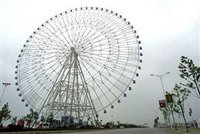 This evening Linda, Levi, and I leave for China. Our destination is Nanchang, China - this will be our home for the next 7 days. It is also where the Yong Feng Orphanage will deliver Ming to us on Sunday. China's economy is booming these days, and according to Newsweek Magazine, Nanchang is included in their list of the world's "Ten Most Dynamic Cities." I hope that means there is a Starbucks there. Here's the scoop from Newsweek:
This evening Linda, Levi, and I leave for China. Our destination is Nanchang, China - this will be our home for the next 7 days. It is also where the Yong Feng Orphanage will deliver Ming to us on Sunday. China's economy is booming these days, and according to Newsweek Magazine, Nanchang is included in their list of the world's "Ten Most Dynamic Cities." I hope that means there is a Starbucks there. Here's the scoop from Newsweek:A star marks the unlikely epicenter of china's second-city explosion. The Star of Nanchang is, unofficially, the world's highest Ferris wheel at almost 162 meters. At night the wheel lights up blue and red with giant neon characters that read, "Nanchang WELCOMES YOU!" It welcomes a lot of people. Nanchang is one of the hottest cities in China, which boasts more fast-growing cities than any other nation by far. Thus the gawdy star marks the epicenter of the global rise of second cities, none more surprising than Nanchang. Though rich in history—a towering seventh-century imperial pavilion rises not far from the Ferris wheel—Nanchang had all but fallen off the economic map before China's investment boom began to move inland from the coast a decade ago. Today it is still the gritty capital of Jiangxi, China's poorest central province, but that's changing as foreign dollars and migrant workers pour in. Cows graze near five-star hotels on the Gan River, and there are almost as many construction sites as buildings.
The turning point dates to 1995, when Ford bought a stake in local Jiangling Motors, which recently posted a 173 percent rise in quarterly profit. Soon after Ford announced plans to add 2,000 new workers in China this year. Its success in Nanchang has rippled across the city, to suppliers like the Nanchang Gear Co. The maker of steering columns and transmissions is growing at double-digit rates, says company regional manager Gui Qunhua Gui. "It's not just the automotive industry," adds Gui, gesturing to a jet plane and a pyramid of beer bottles at a recent local trade show. "Every industry in Nanchang is prospering."
He predicts that because small Chinese cities like Nanchang can grow faster than large rivals, they will begin attracting more speculators and investment. Albert Hawk, founder and chairman of Corstone Capital, couldn't agree more. The U.S. firm has been buying distressed loans and real estate in Nanchang for two years, and Hawk sees huge potential in "these second-tier cities that are only now beginning to take off."
Too fast, at times. With growth overtaxing the electric grid, local leaders prohibited the sale of air conditioners last summer (in a city where the heat breaks 40 degrees Celsius). Still, the mood is bright. Known as the birthplace of Chinese communism because the revolutionaries staged one of their first major uprisings here in 1927, Nanchang today sees itself as the future of Chinese capitalism.
—Quindlen Krovatin http://www.msnbc.msn.com/id/13528949/site/newsweek/page/6/

No comments:
Post a Comment